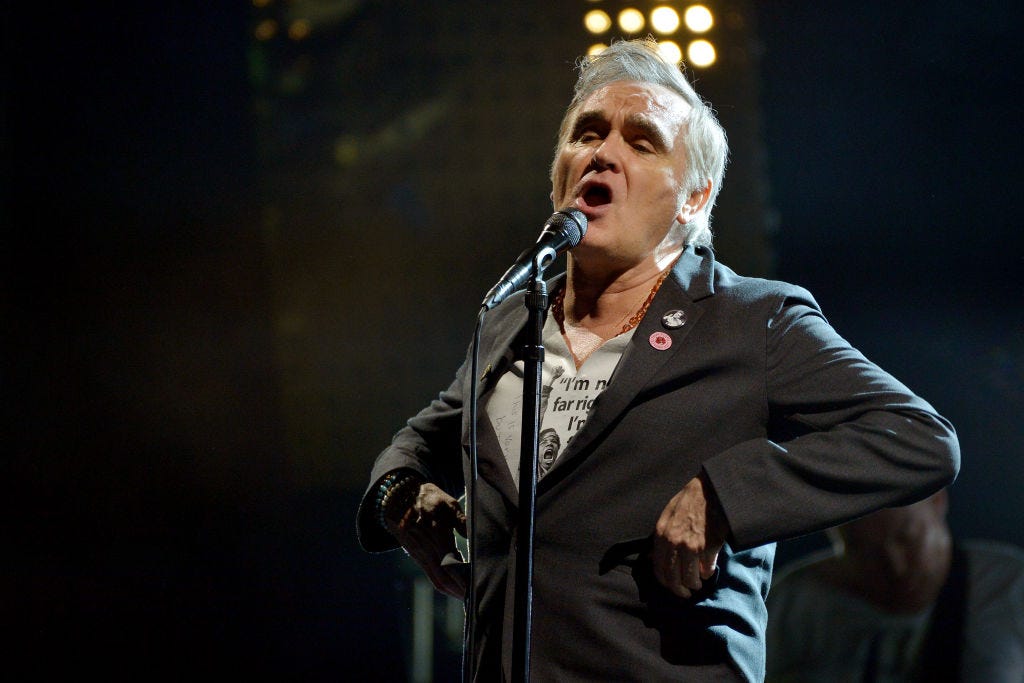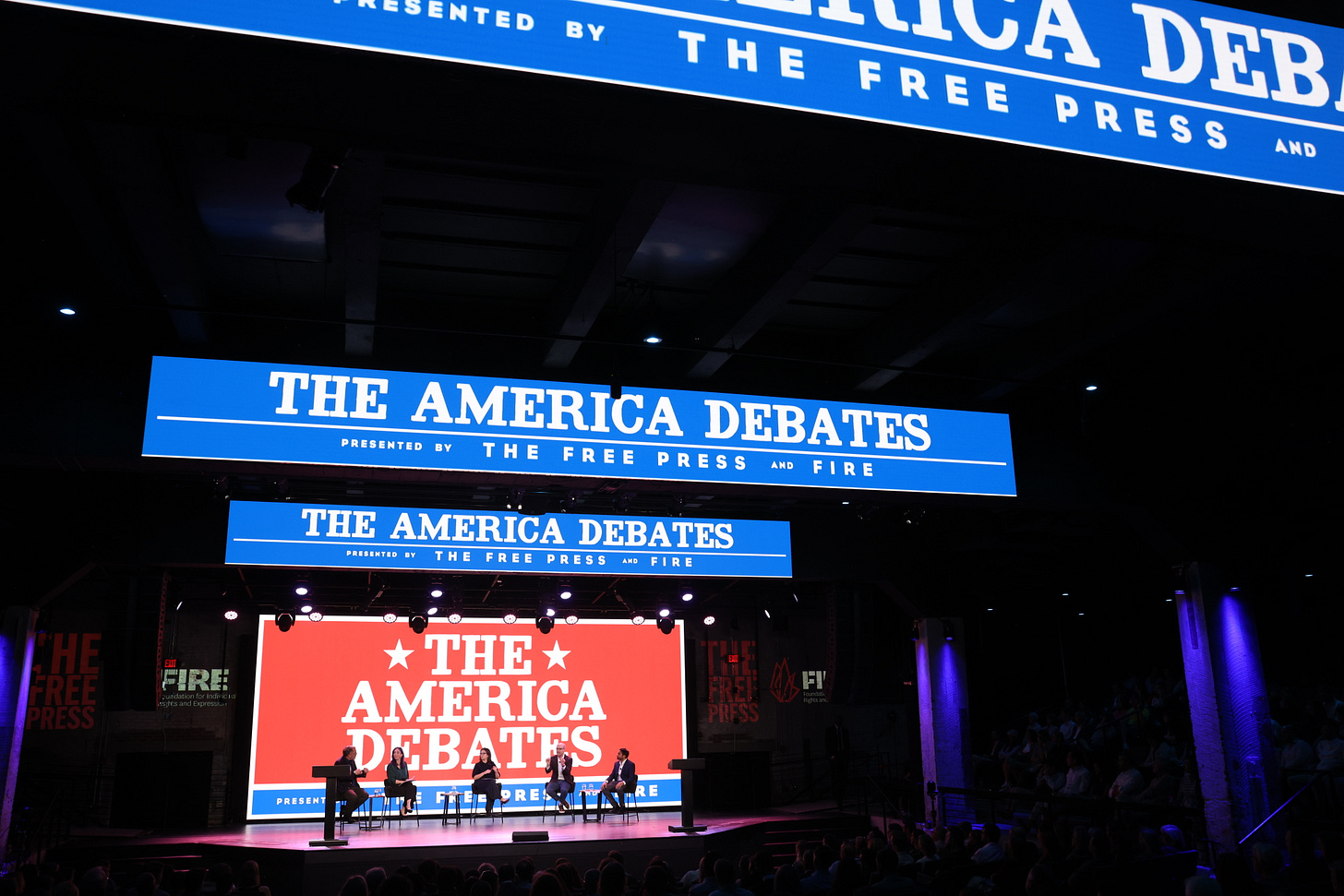
It’s Wednesday, September 11, and this is The Front Page, your daily window into the world of The Free Press—and our take on the world at large.
Today’s edition has been fueled by spicy margaritas at the after-party for the latest Free Press debate in Washington, D.C. More on our debate in a second—as well as the facts on price gouging, the Democrats mad at Nate Silver, and much more. But first, the other debate.
After Donald Trump and Kamala Harris left the stage Tuesday night, Trumpworld was complaining about uneven fact-checking while Harris’s team came out with a call for a second debate. While the ABC hosts maybe let a few too many Kamala fibs slide, if you’re complaining, you’re losing. And these two reactions tell you how the two camps think things went last night.
Meanwhile, Taylor Swift had seen enough. After watching the debate she endorsed Kamala Harris on Instagram, accompanied by a picture of herself and her cat and with the sign-off “Taylor Swift, Childless Cat Lady.”
Also watching: my superstar, Free Press columnist Eli Lake. He argues that Kamala Harris baited Donald Trump—and the former president took it and lost the plot. Read his full rundown of what happened: “Trump Took the Bait. Harris Kept Her Cool.”
The Truth About “Price Gouging”
On the debate stage last night, Kamala Harris said she had “a plan” to “address the price of groceries.” She was referring to a ban on price gouging (also known as price controls) that was the first concrete policy she announced after Joe Biden dropped out of the race. And on the newly launched “issues” page of her website, she blames grocery stores and other “bad actors” for “exploit[ing] an emergency to rip off consumers.”
But what’s the truth about who’s to blame for grocery store prices? Is it a case of greedy corporations squeezing the American consumer? Or something else? Free Press reporter Madeleine Rowley dives into the issue and investigates: “Why Are Grocery Bills So High?”
And for more on this issue, read Stanford economist John H. Cochrane’s recent op-ed for The Free Press: “The Many Wonders of Price Gouging.”
Voters view Kamala Harris as more ideological than Donald Trump. A recent survey found that only one in three voters describe Trump as “too conservative.” By contrast, a plurality—44 percent—say that Harris is “too liberal or progressive.” It’s a sign that voters aren’t buying Harris’s attempt to pivot to the center so far, argues Michael Baharaeen.
The University of Pennsylvania announced Tuesday that it will no longer issue statements on social and political events. “It is not the role of the institution to render opinions—doing so risks suppressing the creativity and academic freedom of our faculty and students,” said the school’s interim president J. Larry Jameson and provost John Jackson. Jameson replaced Liz Magill, who resigned as president in December after her disastrous appearance before Congress, when she couldn’t say definitively whether calling for the genocide of Jews constituted bullying or harassment.
In his new book, The Highest Calling: Conversations on the American Presidency, David Rubenstein spoke to every living president as well as presidential historians about the most stressful job in the world. One especially interesting bit of the book, spotted by Semafor’s Ben Smith, comes when Rubenstein asks George W. Bush for his diagnosis of the rise of populism:
“I listened to (Hank) Paulson and (Ben) Bernanke and spent your money to bail out the guys who created the instruments in the first place, which is an absolute political disaster,” Bush said. “You wonder why populism is on the rise. It starts with taking taxpayers’ money and giving it to the powerful. It really irritated a lot of Americans, and they haven’t gotten over it yet. That’s just part of it; there’s a lot of other reasons why. But we’ve had candidates say, ‘You’re mad, I’m going to make you madder.’ As opposed to, ‘You’re mad, I have some solutions to make you less mad.’ We’re kind of in the madder stage, where people are exploiting the anger as opposed to dealing with it like leaders should.”
On Tuesday, Israel announced it has offered Hamas leader Yahya Sinwar safe passage out of Gaza in exchange for the remaining hostages and control of the strip. Gal Hirsch, Israel’s hostage envoy, told Bloomberg that Israel would also be willing to release prisoners as part of a deal. “I must work on Plan B, C, and D because I must bring the hostages back home,” Hirsch said.
Asked what was on his calendar as he walked to the Marine One helicopter yesterday, a Ray-Ban–clad President Joe Biden said: “I’m going up to my granddaughter’s birthday in New York. Then we’re going to watch the debate and tomorrow I’m doing 9/11.”
The release of Bonfire of Teenagers, the latest solo album by former Smiths singer Morrissey, has been delayed for four years. The reason is “idiot culture,” Morrissey tells The Telegraph’s James Hall. “Every major label in London has refused Bonfire of Teenagers whilst also admitting that it is a masterpiece,” Morrissey claims with characteristic modesty. The title track’s lyrics describe a fan being “vaporized” at the 2017 Islamist terror attack on Manchester Arena, which ends: “Go easy on the killer.” Morrissey tells Hall, “My entire life has relied on free speech.”
The latest in space tourism: A SpaceX rocket carrying four private citizens took off Tuesday from NASA’s Kennedy Space Center in Florida. The five-day mission, Polaris Dawn, will venture further into space than any crew since the Apollo moon program. It’s also set to feature the first spacewalk by an all-civilian crew. Meanwhile, Boeing’s space capsule, the Starliner, returned to Earth empty on Saturday after safety concerns prompted NASA to ask SpaceX to bring back its crew, who are currently chilling at the International Space Station.
Meanwhile, in Washington. . .
I learned something surprising in Washington, D.C., last night: Economics can be fun! Or at least it can when it’s the subject of a Free Press debate. In the penultimate installment of our America Debates series, a socialist, a liberal, and two libertarians debated whether or not the American dream is alive and well.
New York Times columnist David Leonhardt (the liberal) noted that one of the few things Donald Trump and Kamala Harris can agree on is that the American dream is broken. (And that is supposed to persuade me, David?) Don’t worry, he also came armed with plenty of data to make his case—after all, he’s written a book about the ill health of the American dream.
Reason editor Katherine Mangu-Ward (one of the libertarians) asked us to consider a broad definition of the American dream—and noted the almost immeasurable expansion in the choices, freedoms, and opportunities for Americans to live exactly the lives they want over the last half century.
Bhaskar Sunkara (the socialist) said America owed it to the world to fix the broken American dream that has left native-born, working-class Americans behind. “The American dream embodies something universal,” he said, reminding the audience that America once stood as an example to the old of what was possible in a country “without the leftovers of feudalism and aristocratic privilege holding people back.”
As evidence that the American dream was alive and well, economist Tyler Cowen (the other libertarian) pointed to his wife in the audience as the embodiment of the idea: “She grew up in the Soviet Union, where she had no freedom of religion, no freedom of speech, and was afraid of being kicked out of university because it was stamped ‘Jewish’ in her passport. She came here with an advanced degree in linguistics, and the first job she had was selling donuts in Pentagon City Hall. . . Before I met her, she was already outearning me.”
A recurring theme from the “Yes” side: People vote with their feet and they overwhelmingly vote in favor of America by moving here in huge numbers. A recurring theme from the “No” side: Listen to the country. The American people are clearly not happy, and a big part of that discontent comes back to the broken promise of the American dream.
At the start of the debate, the audience voted on whether they thought the American dream was still alive. Seventy-one percent said yes. Twenty-nine percent said no. But who came out on top after the debate? For the answer to that question, you’ll have to wait for the full release of the debate video, which is coming soon.
Has Nate Silver ‘Been Bought’? (No.)
As we reported in Monday’s Front Page, Nate Silver’s election forecast model has shown the presidential race moving in Donald Trump’s favor in recent days. Right now it puts the former president’s chances of winning at 61 percent, and Kamala Harris’s chances are at 38 percent. You’ll be unsurprised to learn that this has made a lot of Democrats very annoyed—and rather than channeling their frustration into, say, voter registration drives, a lot of them are taking it out on Nate on X.
No surprise there, I suppose: Shooting the messenger is dumb, but it’s also human nature. But this week’s attacks on our favorite data guru have taken a deranged, conspiratorial concern. Out there in the Blue Anon fever swamps a theory has taken hold that goes something like this: Nate Silver is deliberately downplaying Harris’s chances of victory because he is an adviser to Polymarket, an online prediction market, and one of the investors in Polymarket is Founders Fund, Peter Thiel’s venture capital firm. And because Peter Thiel has supported Donald Trump in the past, Nate is obviously conspiring to make Harris look bad. Or something. The people pushing this crazy idea are mostly nobodies—but some of them at least claim to be serious political consultants and commentators. One of them is Stuart Stevens, the former Romney strategist who is now a #Resistance type affiliated with The Lincoln Project. He’s the type of pundit who warns about decaying trust in institutions, and the spread of fake news and Trump’s lies and so on. And yet he spent yesterday blathering on about Nate Silver being “paid by Peter Thiel” all because his model isn’t spitting out the results Stevens would like.
I texted Nate to see what he thought about all this nuttiness. He told me he’d noticed “the growth of what is basically Blue MAGA for a while in the form of things like conspiracy theories about the assassination attempt against Trump. When people come to believe they’re the good and righteous ones, that can enable a lot of bad behavior.”
At risk of stating the obvious, Nate Silver has not been bought. Far from it, in fact. He’s going it alone on Substack (subscribe here) this cycle after Disney gutted FiveThirtyEight, the media company he built and then sold to them. Although in one sense, I suppose Nate has been bought—by his readers. “Let me reiterate once again that it’s much more amusing to have dumb crazy people tweet lies about you when you also have a lot of smart, sane people subscribing to your newsletter,” he said on X yesterday. A sentiment we recognize here at The Free Press.
Listen to Nate Silver talk about risk, poker data, and the election in his recent appearance on Honestly.
Oliver Wiseman is a writer and editor for The Free Press. Follow him on X @ollywiseman.
To support The Free Press, become a paid subscriber today:
And if you’re enjoying The Front Page, consider forwarding it to someone else you think might like it.





